-
 2014 NEREC Conference on Nuclear Nonproliferation: July 31-August 1, 2014, Seoul
The Nonproliferation Education and Research Center (NEREC) at KAIST hosted an international conference on nuclear nonproliferation on July 31-August 1, 2014 in Seoul. The Ministry of Science, ICT and Future Planning, the Korean Nuclear Safety and Security Commission, and the Korea Nuclear Policy Society (KNPS) sponsored the event.
Over one hundred experts and "thought leaders" in nuclear security and nonproliferation attended the conference and discussed issues related to the nonproliferation of nuclear weapons, the role of scientific community in mitigating nuclear threat and promoting the peaceful use of nuclear power, and nuclear disarmament policy.
Keynote speakers were: Steven E. Miller, Director of International Security Program at Belfer Center for Science and International Affairs, Harvard University; Scott D. Sagan, Senior Fellow of the Center for International Security and Cooperation, Freeman Spogli Institute for International Studies, Stanford University; Mark Fitzpatrick, Director of the Nonproliferation and Disarmament Programme, International Institute for Strategic Studies; Sang-Hyun Lee, Director of Security Strategy, Sejong Institute; and Man-Sung Yim, Professor of Nuclear and Quantum Engineering, KAIST.
At the conference, Professor Yim, Director of KAIST NEREC said, “Korea has grown to become a key player in the development of commercial nuclear energy over the past decades. We hope that our conference encourages Korea to be more involved in the efforts of the international community to enhance the global nonproliferation regime.”
2014.08.05 View 12458
2014 NEREC Conference on Nuclear Nonproliferation: July 31-August 1, 2014, Seoul
The Nonproliferation Education and Research Center (NEREC) at KAIST hosted an international conference on nuclear nonproliferation on July 31-August 1, 2014 in Seoul. The Ministry of Science, ICT and Future Planning, the Korean Nuclear Safety and Security Commission, and the Korea Nuclear Policy Society (KNPS) sponsored the event.
Over one hundred experts and "thought leaders" in nuclear security and nonproliferation attended the conference and discussed issues related to the nonproliferation of nuclear weapons, the role of scientific community in mitigating nuclear threat and promoting the peaceful use of nuclear power, and nuclear disarmament policy.
Keynote speakers were: Steven E. Miller, Director of International Security Program at Belfer Center for Science and International Affairs, Harvard University; Scott D. Sagan, Senior Fellow of the Center for International Security and Cooperation, Freeman Spogli Institute for International Studies, Stanford University; Mark Fitzpatrick, Director of the Nonproliferation and Disarmament Programme, International Institute for Strategic Studies; Sang-Hyun Lee, Director of Security Strategy, Sejong Institute; and Man-Sung Yim, Professor of Nuclear and Quantum Engineering, KAIST.
At the conference, Professor Yim, Director of KAIST NEREC said, “Korea has grown to become a key player in the development of commercial nuclear energy over the past decades. We hope that our conference encourages Korea to be more involved in the efforts of the international community to enhance the global nonproliferation regime.”
2014.08.05 View 12458 -
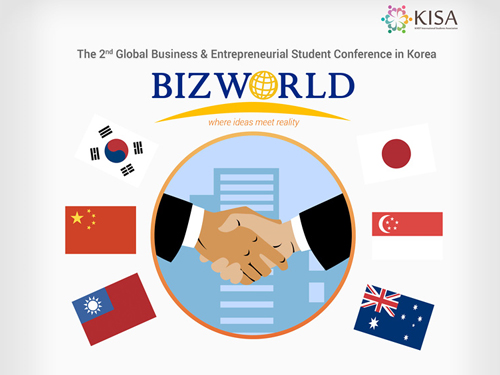 BizWorld 2014 Takes Place at the KAIST campus: July 28-August 2, 2014
A multinational student conference on science, technology, and business called “BizWorld 2014 (http://kisa.kaist.ac.kr/bizworld/kaist/)” began on July 28, 2014 and continues through August 2, 2014 at the KAIST campus in Daejeon.
Created in 2013 by international students at KAIST, the conference aims to promote entrepreneurship among students within KAIST as well as those from other nations and to exchange knowledge and experiences in translating technological and scientific innovations into business opportunities.
The KAIST International Student Association (KISA) hosts the conference in partnership with five universities in the Asia-Pacific region: Peking University in China, National Taiwan University in Taiwan, the University of Tokyo in Japan, National University of Singapore, and the University of Queensland in Australia.
This year, four distinguished speakers from the Korean government and private sector will give talks on job creation through science and technology advancement, strategic management of technology, and trends in information technology business.
Participating students will also visit laboratories for electric vehicles being developed by KAIST: Armadilo T and the Online Electric Vehicle (OLEV).
The Armadillo T is a small, light, and agile electric car that folds its body for an efficient use of space. OLEV can be an electric car, bus, or even a high-capacity train, which is recharged wirelessly while on-the-go.
The s tudents will have a Q&A meeting with researchers and discuss a possible business model to commercialize these technologies.
2014.07.30 View 8938
BizWorld 2014 Takes Place at the KAIST campus: July 28-August 2, 2014
A multinational student conference on science, technology, and business called “BizWorld 2014 (http://kisa.kaist.ac.kr/bizworld/kaist/)” began on July 28, 2014 and continues through August 2, 2014 at the KAIST campus in Daejeon.
Created in 2013 by international students at KAIST, the conference aims to promote entrepreneurship among students within KAIST as well as those from other nations and to exchange knowledge and experiences in translating technological and scientific innovations into business opportunities.
The KAIST International Student Association (KISA) hosts the conference in partnership with five universities in the Asia-Pacific region: Peking University in China, National Taiwan University in Taiwan, the University of Tokyo in Japan, National University of Singapore, and the University of Queensland in Australia.
This year, four distinguished speakers from the Korean government and private sector will give talks on job creation through science and technology advancement, strategic management of technology, and trends in information technology business.
Participating students will also visit laboratories for electric vehicles being developed by KAIST: Armadilo T and the Online Electric Vehicle (OLEV).
The Armadillo T is a small, light, and agile electric car that folds its body for an efficient use of space. OLEV can be an electric car, bus, or even a high-capacity train, which is recharged wirelessly while on-the-go.
The s tudents will have a Q&A meeting with researchers and discuss a possible business model to commercialize these technologies.
2014.07.30 View 8938 -
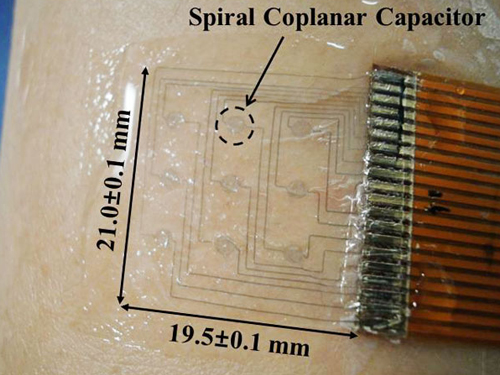 Newsweek: The Goosebump Sensor That Knows How You Feel
Newsweek covered the introduction of the goosebump sensor invented by Professor Young-Ho Cho of the Department of Bio and Brain Engineering at KAIST in an article dated July 27, 2014.
The article entitled “The Goosebump Sensor That Knows How You Feel” explains how the sensor works and reports on the current research and development trends in emotion-sensing technology.
Professor Cho’s research paper was originally published in the journal Applied Physics Letters on June 24, 2014, titled “A Flexible Skin Piloerection Monitoring Sensor."
Newsweek, July 27, 2014
“The Goosebump Sensor That Knows How You Feel”
http://www.newsweek.com/goosebump-sensor-knows-how-you-feel-260689
2014.07.28 View 7681
Newsweek: The Goosebump Sensor That Knows How You Feel
Newsweek covered the introduction of the goosebump sensor invented by Professor Young-Ho Cho of the Department of Bio and Brain Engineering at KAIST in an article dated July 27, 2014.
The article entitled “The Goosebump Sensor That Knows How You Feel” explains how the sensor works and reports on the current research and development trends in emotion-sensing technology.
Professor Cho’s research paper was originally published in the journal Applied Physics Letters on June 24, 2014, titled “A Flexible Skin Piloerection Monitoring Sensor."
Newsweek, July 27, 2014
“The Goosebump Sensor That Knows How You Feel”
http://www.newsweek.com/goosebump-sensor-knows-how-you-feel-260689
2014.07.28 View 7681 -
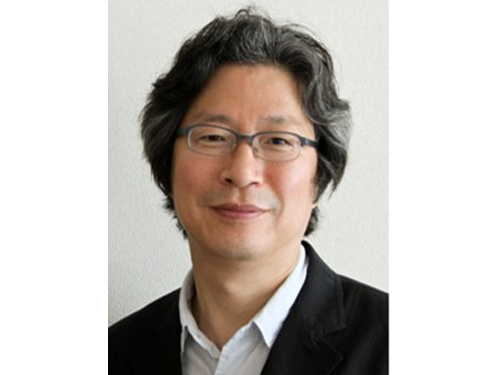 The Journal of Clinical Investigation: Researchers Uncover the Secret Lymphatic Identity of the Schlemm's Canal
The Journal of Clinical Investigation (JCI), a peer-reviewed, top-tier medical journal published by the American Society for Clinical Investigation, carried a commentary entitled “Schlemm’s Canal: More Than Meets the Eye, Lymphatics in Disguise” in the July 25, 2014 issue.
In the commentary, the authors compared a research paper (“Lymphatic regular PROX1 determines Schlemm’s canal integrity and identity”) by Professor Gou-Young Koh of the Graduate School of Medical Science and Engineering at KAIST with research work from the University of Helsinki (article entitled “The Schlemm’s canal is a VEGF-C/VEGFR-3 responsive lymphatic-like vessel”).
The JCI released a press statement dated July 25, 2014 on its commentary. It mentioned that glaucoma, one of the leading causes of blindness worldwide, elevates eye pressure owing to poor drainage of aqueous humor. A specialized structure called “Schlemm’s canal” funnels aqueous humor from the eye back into circulation, which is critical to prevent pressure buildup in the eye. The article discussed the role of Schlemm’s canal in the context of lymphatic vascular characteristics by reviewing two research group’s papers back-to-back.
For the full text of the press release, please visit the link below:
Press Release from the Journal of Clinical Investigation, July 25, 2014
“Researchers uncover the secret lymphatic identity of the Schlemm’s canal”
http://www.eurekalert.org/pub_releases/2014-07/joci-rut072414.php
2014.07.28 View 7710
The Journal of Clinical Investigation: Researchers Uncover the Secret Lymphatic Identity of the Schlemm's Canal
The Journal of Clinical Investigation (JCI), a peer-reviewed, top-tier medical journal published by the American Society for Clinical Investigation, carried a commentary entitled “Schlemm’s Canal: More Than Meets the Eye, Lymphatics in Disguise” in the July 25, 2014 issue.
In the commentary, the authors compared a research paper (“Lymphatic regular PROX1 determines Schlemm’s canal integrity and identity”) by Professor Gou-Young Koh of the Graduate School of Medical Science and Engineering at KAIST with research work from the University of Helsinki (article entitled “The Schlemm’s canal is a VEGF-C/VEGFR-3 responsive lymphatic-like vessel”).
The JCI released a press statement dated July 25, 2014 on its commentary. It mentioned that glaucoma, one of the leading causes of blindness worldwide, elevates eye pressure owing to poor drainage of aqueous humor. A specialized structure called “Schlemm’s canal” funnels aqueous humor from the eye back into circulation, which is critical to prevent pressure buildup in the eye. The article discussed the role of Schlemm’s canal in the context of lymphatic vascular characteristics by reviewing two research group’s papers back-to-back.
For the full text of the press release, please visit the link below:
Press Release from the Journal of Clinical Investigation, July 25, 2014
“Researchers uncover the secret lymphatic identity of the Schlemm’s canal”
http://www.eurekalert.org/pub_releases/2014-07/joci-rut072414.php
2014.07.28 View 7710 -
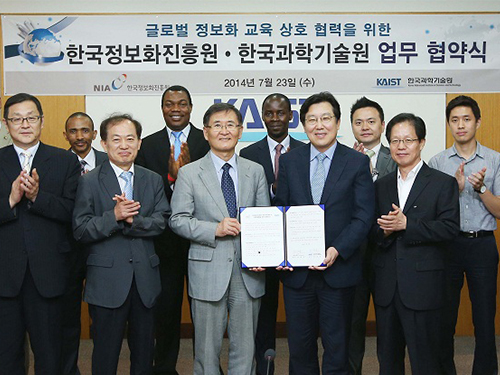 Cooperation Agreement with Korea's National Information Society Agency on Global Information Education
KAIST and the National Information Society Agency (NIA) signed a memorandum of understanding (MOU) to launch global information education cooperation. President Steve Kang and President Kwang-Soo Chang of NIA, attended the signing ceremony held at KAIST on July 23, 2014.
Under the MOU, KAIST and NIA will jointly develop contents for global information education; plan and operate educational programs; provide consulting services to train experts in information; and implement exchange programs for faculty and students.
In addition, the two organizations plan to cooperate in the establishment of a network, consisting of alumni and students from the Global Information and Telecommunications Technology Program at KAIST (KAIST ITTP), to deliver a Korean model of electronic government (e-government) to other nations worldwide.
President Kang said, “Korea is one of the most wired nations in the world. By working with the NIA, we hope to have an opportunity to export our knowledge and experiences in the construction of e-governments to less technologically advanced nations by becoming a good precedent for them.”
Since 2006, KAIST has invited 20-30 government officials from underdeveloped or developing countries each year, offering them enrollment in graduate programs at KAIST ITTP.
2014.07.25 View 7220
Cooperation Agreement with Korea's National Information Society Agency on Global Information Education
KAIST and the National Information Society Agency (NIA) signed a memorandum of understanding (MOU) to launch global information education cooperation. President Steve Kang and President Kwang-Soo Chang of NIA, attended the signing ceremony held at KAIST on July 23, 2014.
Under the MOU, KAIST and NIA will jointly develop contents for global information education; plan and operate educational programs; provide consulting services to train experts in information; and implement exchange programs for faculty and students.
In addition, the two organizations plan to cooperate in the establishment of a network, consisting of alumni and students from the Global Information and Telecommunications Technology Program at KAIST (KAIST ITTP), to deliver a Korean model of electronic government (e-government) to other nations worldwide.
President Kang said, “Korea is one of the most wired nations in the world. By working with the NIA, we hope to have an opportunity to export our knowledge and experiences in the construction of e-governments to less technologically advanced nations by becoming a good precedent for them.”
Since 2006, KAIST has invited 20-30 government officials from underdeveloped or developing countries each year, offering them enrollment in graduate programs at KAIST ITTP.
2014.07.25 View 7220 -
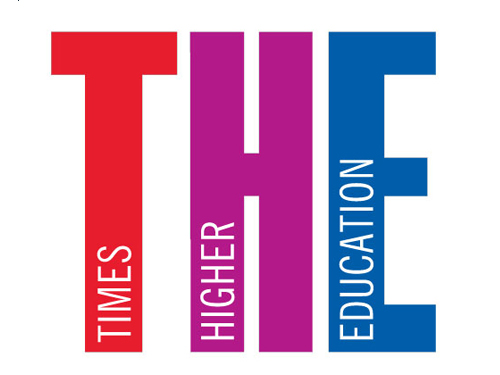 Times Higher Education magazine features KAIST, July 2014
The Times Higher Education (THE) has featured KAIST in an article entitled “Young Universities’ Secrets of Success” dated on July 17, 2014.
The magazine chose five universities from the Times Higher Education's 100 Under 50 2014 rankings: KAIST, Koç University in Turkey, Maastricht University in Netherlands, Nanyang Technological University in Singapore, and Hong Kong Polytechnic University, China. These universities are less than 50 years old.
The article highlighted some of their current efforts to deliver quality administrative service for students and professors as well as innovative education and research programs to set them apart from long-established elite universities such as Harvard and Cambridge.
For the full text, please visit the link below:
Times Higher Education, July 17, 2014
“Young Universities’ Secret of Success”
http://www.kaist.ac.kr/Upl/downfile/THE's_Article_Jul_17_2014.pdf
2014.07.23 View 6686
Times Higher Education magazine features KAIST, July 2014
The Times Higher Education (THE) has featured KAIST in an article entitled “Young Universities’ Secrets of Success” dated on July 17, 2014.
The magazine chose five universities from the Times Higher Education's 100 Under 50 2014 rankings: KAIST, Koç University in Turkey, Maastricht University in Netherlands, Nanyang Technological University in Singapore, and Hong Kong Polytechnic University, China. These universities are less than 50 years old.
The article highlighted some of their current efforts to deliver quality administrative service for students and professors as well as innovative education and research programs to set them apart from long-established elite universities such as Harvard and Cambridge.
For the full text, please visit the link below:
Times Higher Education, July 17, 2014
“Young Universities’ Secret of Success”
http://www.kaist.ac.kr/Upl/downfile/THE's_Article_Jul_17_2014.pdf
2014.07.23 View 6686 -
 Smart eBook appeared in New York Times on May 17, 2014
Smart eBook (hhttp://www.youtube.com/watch?v=rVyBwz1-AiE), an interface that allows e-book readers to have the similar experience and convenience to reading paper books, was introduced in an article from the New York Times on May 17, 2014. The Smart eBook was developed by researchers from the Institute for Information Technology Convergence at KAIST.
For the article, please go to the link below:
New York Times, May 17, 2014
“Tackling the Limits of Touch Screens”
http://www.nytimes.com/2014/05/18/business/tackling-the-limits-of-touch-screens.html?_r=0
2014.07.21 View 6317
Smart eBook appeared in New York Times on May 17, 2014
Smart eBook (hhttp://www.youtube.com/watch?v=rVyBwz1-AiE), an interface that allows e-book readers to have the similar experience and convenience to reading paper books, was introduced in an article from the New York Times on May 17, 2014. The Smart eBook was developed by researchers from the Institute for Information Technology Convergence at KAIST.
For the article, please go to the link below:
New York Times, May 17, 2014
“Tackling the Limits of Touch Screens”
http://www.nytimes.com/2014/05/18/business/tackling-the-limits-of-touch-screens.html?_r=0
2014.07.21 View 6317 -
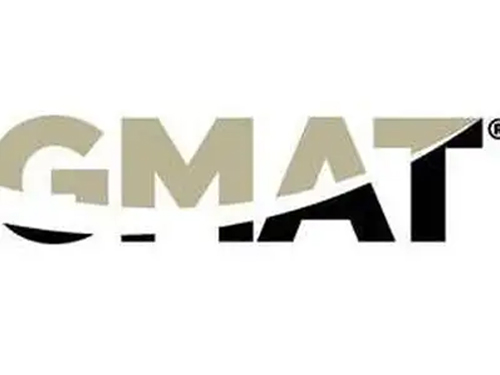 Interview with KAIST MBA: 5 Reasons to Study in Korea for Your MBA
The Graduate Management Admission Council (GMAC) published online an interview with Mija Yoon, the director of the Admission & Placement Center at KAIST College of Business (KAIST MBA) in Seoul, Korea, on July 18, 2014.
In the interview, Director Yoon listed the benefits of studying MBA programs at Korean universities, as well as working in Korea.
For the article, please visit the link below:
GMAT, July 18, 2014
“5 Reasons to Study in Korea for Your MBA”
http://www.beatthegmat.com/mba/2014/07/18/5-reasons-to-study-in-korea-for-your-mba
2014.07.21 View 8720
Interview with KAIST MBA: 5 Reasons to Study in Korea for Your MBA
The Graduate Management Admission Council (GMAC) published online an interview with Mija Yoon, the director of the Admission & Placement Center at KAIST College of Business (KAIST MBA) in Seoul, Korea, on July 18, 2014.
In the interview, Director Yoon listed the benefits of studying MBA programs at Korean universities, as well as working in Korea.
For the article, please visit the link below:
GMAT, July 18, 2014
“5 Reasons to Study in Korea for Your MBA”
http://www.beatthegmat.com/mba/2014/07/18/5-reasons-to-study-in-korea-for-your-mba
2014.07.21 View 8720 -
 Op-ed on Korea's economic success and KAIST: Making the impossible possible
Professor Ajith de Alwis of the Department of Chemical and Process Engineering at the University of Moratuwa, Sri Lanka, contributed an op-ed to DailyFT, a daily English-language newspaper published in Colombo, Sri Lanka, on July 17, 2014. The piece entitled “Making the impossible possible!” introduced Korea’s advancement and the role of KAIST as an important feeder for the development of science and technology in the nation.
For the op-ed, please go to the link below:
DailyFT, Op-ed, July 17, 2014
“Making the impossible possible!”
By Ajith de Alwis
2014.07.17 View 6132
Op-ed on Korea's economic success and KAIST: Making the impossible possible
Professor Ajith de Alwis of the Department of Chemical and Process Engineering at the University of Moratuwa, Sri Lanka, contributed an op-ed to DailyFT, a daily English-language newspaper published in Colombo, Sri Lanka, on July 17, 2014. The piece entitled “Making the impossible possible!” introduced Korea’s advancement and the role of KAIST as an important feeder for the development of science and technology in the nation.
For the op-ed, please go to the link below:
DailyFT, Op-ed, July 17, 2014
“Making the impossible possible!”
By Ajith de Alwis
2014.07.17 View 6132 -
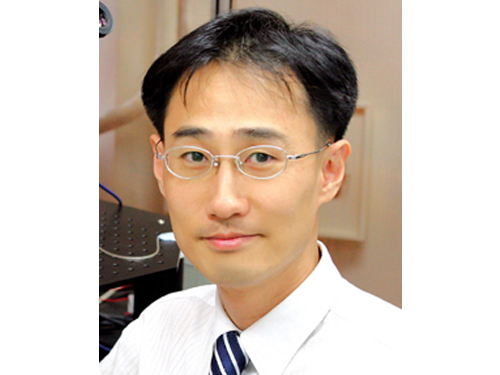 Discovery of New Therapeutic Targets for Alzheimer's Disease
A Korean research team headed by Professor Dae-Soo Kim of Biological Sciences at KAIST and Dr. Chang-Jun Lee from the Korea Institute of Science and Technology (KIST) successfully identified that reactive astrocytes, commonly observed in brains affected by Alzheimer’s disease, produce abnormal amounts of inhibitory neurotransmitter gamma-Aminobutyric acid (GABA) in reaction to the enzyme Monoamine oxidase B (Mao-B) and release GABA through the Bestrophin-1 channel to suppress the normal signal transmission of brain nerve cells.
By suppressing the GABA production or release from reactive astrocytes, the research team was able to restore the model mice's memory and learning impairment caused by Alzheimer’s disease. This discovery will allow the development of new drugs to treat Alzheimer’s and other related diseases.
The research result was published in the June 29, 2014 edition of Nature Medicine (Title: GABA from Reactive Astrocytes Impairs Memory in Mouse Models of Alzheimer’s Disease).
For details, please read the article below:
Technology News, July 10, 2014
"Discovery of New Drug Targets for Memory Impairment in Alzheimer’s Disease"
http://technews.tmcnet.com/news/2014/07/10/7917811.htm
2014.07.16 View 8359
Discovery of New Therapeutic Targets for Alzheimer's Disease
A Korean research team headed by Professor Dae-Soo Kim of Biological Sciences at KAIST and Dr. Chang-Jun Lee from the Korea Institute of Science and Technology (KIST) successfully identified that reactive astrocytes, commonly observed in brains affected by Alzheimer’s disease, produce abnormal amounts of inhibitory neurotransmitter gamma-Aminobutyric acid (GABA) in reaction to the enzyme Monoamine oxidase B (Mao-B) and release GABA through the Bestrophin-1 channel to suppress the normal signal transmission of brain nerve cells.
By suppressing the GABA production or release from reactive astrocytes, the research team was able to restore the model mice's memory and learning impairment caused by Alzheimer’s disease. This discovery will allow the development of new drugs to treat Alzheimer’s and other related diseases.
The research result was published in the June 29, 2014 edition of Nature Medicine (Title: GABA from Reactive Astrocytes Impairs Memory in Mouse Models of Alzheimer’s Disease).
For details, please read the article below:
Technology News, July 10, 2014
"Discovery of New Drug Targets for Memory Impairment in Alzheimer’s Disease"
http://technews.tmcnet.com/news/2014/07/10/7917811.htm
2014.07.16 View 8359 -
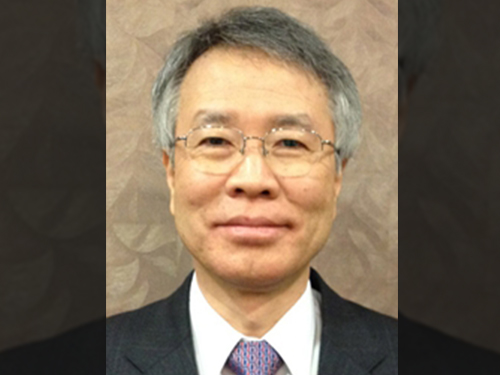 Professor Kyu-Young Whang Receives Contributions Award from ACM SIGMOD
Kyu-Young Whang, Distinguished Professor of Computer Science at KAIST, was the recipient of the 2014 ACM SIGMOND Contributions Award.
Founded in 1947, the Association for Computing Machinery (ACM) is the world’s largest educational and scientific computing society, delivering resources that advance computing as a science and profession.
SIGMOD is the Association for Computing Machinery’s Special Interest Group on Management of Data, which specializes in large-scale data management problems and databases.
Since 1992, ACM SIGMOND has presented the contributions award to one scientist who has made significant contributions to the field of database systems through research funding, education, and professional services. So far, 23 people including Professor Whang have received the award.
Professor Whang was recognized for his key role in the growth of international conferences and journals in the field of databases such as The VLDB Journal (The International Journal on Very Large Data Bases), VLDB Endowment Inc., IEEE Technical Committee on Data Engineering, and Database Systems for Advanced Applications (DASFAA). IEEE stands for the Institute of Electrical and Electronics Engineering.
For the full list of ACM SIGMOND Contributions Award recipients, please go to
http://www.sigmod.org/sigmod-awards/sigmod-awards#contributions.
2014.07.15 View 8197
Professor Kyu-Young Whang Receives Contributions Award from ACM SIGMOD
Kyu-Young Whang, Distinguished Professor of Computer Science at KAIST, was the recipient of the 2014 ACM SIGMOND Contributions Award.
Founded in 1947, the Association for Computing Machinery (ACM) is the world’s largest educational and scientific computing society, delivering resources that advance computing as a science and profession.
SIGMOD is the Association for Computing Machinery’s Special Interest Group on Management of Data, which specializes in large-scale data management problems and databases.
Since 1992, ACM SIGMOND has presented the contributions award to one scientist who has made significant contributions to the field of database systems through research funding, education, and professional services. So far, 23 people including Professor Whang have received the award.
Professor Whang was recognized for his key role in the growth of international conferences and journals in the field of databases such as The VLDB Journal (The International Journal on Very Large Data Bases), VLDB Endowment Inc., IEEE Technical Committee on Data Engineering, and Database Systems for Advanced Applications (DASFAA). IEEE stands for the Institute of Electrical and Electronics Engineering.
For the full list of ACM SIGMOND Contributions Award recipients, please go to
http://www.sigmod.org/sigmod-awards/sigmod-awards#contributions.
2014.07.15 View 8197 -
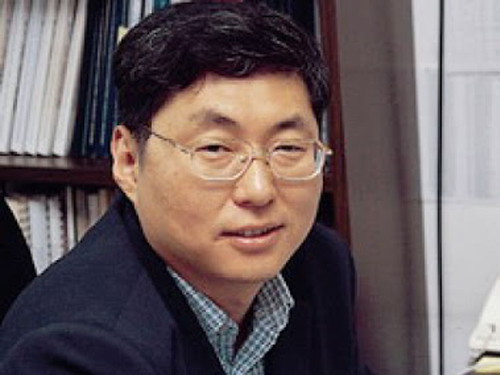 Workshop on Wearable Healthcare Takes Place on July 15, 2014
A workshop on wearable healthcare was held at KAIST campus on July 15, 2014.
In recent years, wearable healthcare has received much attention as an emerging technology that will have a great impact on our society.
At the workshop, participants from academia and industry reviewed the Korean healthcare industry and discussed issues related to the development of a wearable healthcare industry in Korea, while capitalizing on the nation’s strength in information and communications.
Professor Hoi-Jun Yoo of Electrical Engineering at KAIST, the chairman of the organizing committee of the workshop, presented a keynote speech entitled “The Current State and Future of Wearable Healthcare,” arguing that the wearable healthcare industry developed through the Internet of things and big data would become the next-generation growth engine for Korea.
Other key presentations were “Smart Glasses and Micro Display Semiconductor Technology” by Bo-Eun Kim, Chief Executive Officer of Raon-Tech, Inc., “Wearable Device: A Comprehensive Approach” by Min-Kyu Je, a professor of Daegu Gyeongbuk Institute of Science and Technology, and “Microwave Imaging System for Breast Cancer Detection” by Seung-Joon Lee, a professor of Ewha Woman’s University.
Professor Yoo said, “We hope that the workshop will provide good momentum for participants to evaluate the Korean healthcare industry in the context of the Internet of things, information and communications technology, and medical technology as well as offering practical solutions to nurture the indigenous wearable healthcare industry in Korea.”
2014.07.15 View 8103
Workshop on Wearable Healthcare Takes Place on July 15, 2014
A workshop on wearable healthcare was held at KAIST campus on July 15, 2014.
In recent years, wearable healthcare has received much attention as an emerging technology that will have a great impact on our society.
At the workshop, participants from academia and industry reviewed the Korean healthcare industry and discussed issues related to the development of a wearable healthcare industry in Korea, while capitalizing on the nation’s strength in information and communications.
Professor Hoi-Jun Yoo of Electrical Engineering at KAIST, the chairman of the organizing committee of the workshop, presented a keynote speech entitled “The Current State and Future of Wearable Healthcare,” arguing that the wearable healthcare industry developed through the Internet of things and big data would become the next-generation growth engine for Korea.
Other key presentations were “Smart Glasses and Micro Display Semiconductor Technology” by Bo-Eun Kim, Chief Executive Officer of Raon-Tech, Inc., “Wearable Device: A Comprehensive Approach” by Min-Kyu Je, a professor of Daegu Gyeongbuk Institute of Science and Technology, and “Microwave Imaging System for Breast Cancer Detection” by Seung-Joon Lee, a professor of Ewha Woman’s University.
Professor Yoo said, “We hope that the workshop will provide good momentum for participants to evaluate the Korean healthcare industry in the context of the Internet of things, information and communications technology, and medical technology as well as offering practical solutions to nurture the indigenous wearable healthcare industry in Korea.”
2014.07.15 View 8103